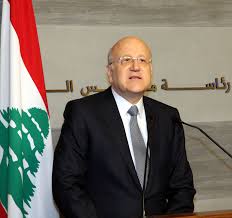|
Getting your Trinity Audio player ready...
|
By Guy Birchall -Epoch Times
Lebanon’s Prime Minister Najib Mikati has said that he hopes a ceasefire can soon be reached between Israel and the Iranian-backed Hezbollah terrorist group.
The United States, UK, France, Germany, Japan and several others called for an immediate 21-day ceasefire across the Israel-Lebanon border on Wednesday, while also expressing support for a ceasefire in Gaza following intense discussions at the United Nations.
Mikati welcomed the call for a truce but said the key to implementing it was whether Israel, which has been relocating troops closer to the Lebanese border, is committed to enforcing international resolutions.
Asked if a ceasefire could be secured soon, he said, “Hopefully, yes.”
The heaviest airstrikes against Hamas in Lebanon in nearly two decades have sharply intensified since Monday, with more than 600 people killed in recent days, according to Lebanese authorities.
The statement, released by 11 nations and the EU, states that the goal is to enable civilians on both sides of the border to return to their homes in safety because diplomacy can’t “succeed amid an escalation of this conflict.”
Israeli Military Chief Orders Forces to Prepare for Possible Ground Assault on Lebanon
“The situation between Lebanon and Israel since Oct. 8, 2023, is intolerable and presents an unacceptable risk of a broader regional escalation,” the statement reads.
“This is in nobody’s interest, neither of the people of Israel nor of the people of Lebanon,” it added.
Lebanon’s caretaker administration, headed by Mikati, includes ministers chosen by Hezbollah, which is widely seen as the most potent political force in the country.
The ceasefire would apply to the Israel-Lebanon “Blue Line,” the demarcation line between the countries, and would allow the parties to negotiate towards a potential diplomatic resolution of the conflict, according to a senior White House official.
The Blue Line was created by the UN as a demarcation boundary in 2000 to verify Israel’s full withdrawal from Lebanon after an 18-year military presence, which began in 1982 in response to Palestinian Liberation Organization (PLO) attacks from Lebanon on Israeli civilians.
UN Special Coordinator for Lebanon Jeanine Hennis-Plasschaert said on Thursday that she welcomed the call for an immediate 21-day ceasefire to allow space for diplomacy to succeed.
However, there was no let-up in the violence overnight as Israel hit around 75 Hezbollah targets in the Bekaa Valley and southern Lebanon, including weapons storage facilities and ready-to-fire launchers, the Israeli Defense Forces said on Thursday.
One such strike reportedly killed at least 23 Syrians, most of them women and children, when a three-story building in the town of Younine was hit, the town’s mayor, Ali Qusas, told Reuters.
Around 1.5 million Syrians who fled the civil war are resident in Lebanon.
Israel has made a priority of securing its northern border and allowing the return of some 70,000 citizens displaced by near-daily exchanges of fire, which Hezbollah initiated a year ago in solidarity with Hamas in Gaza.
Israel widened its airstrikes in Lebanon on Wednesday and at least 72 people were killed, according to Lebanese health ministry statements. The ministry also said at least 223 were wounded.
Around half a million have fled their homes in the country, and Lebanese hospitals have been inundated with those who have sustained injuries.
The bombing follows attacks last week when pagers and walkie-talkies exploded across Lebanon, killing dozens and wounding thousands more.
Israel’s military chief said a ground assault was possible, raising fears the conflict could spark a wider Middle East war.
Israel’s ambassador to the UN Danny Danon told reporters before a Security Council meeting on Wednesday that the Jewish state would welcome a ceasefire and preferred a diplomatic solution.
He then told the council that Iran was the main cause of violence in the region, and peace required dismantling the threat from Tehran.
Hezbollah and Hamas are both sponsored by the Islamic Republic.
World leaders voiced concern that the conflict—running in parallel to Israel’s war in Gaza—was escalating rapidly.
Israeli airstrikes this week have targeted Hezbollah leaders and hit hundreds of sites deep inside Lebanon. The group has responded with barrages of rockets fired into Israel.





